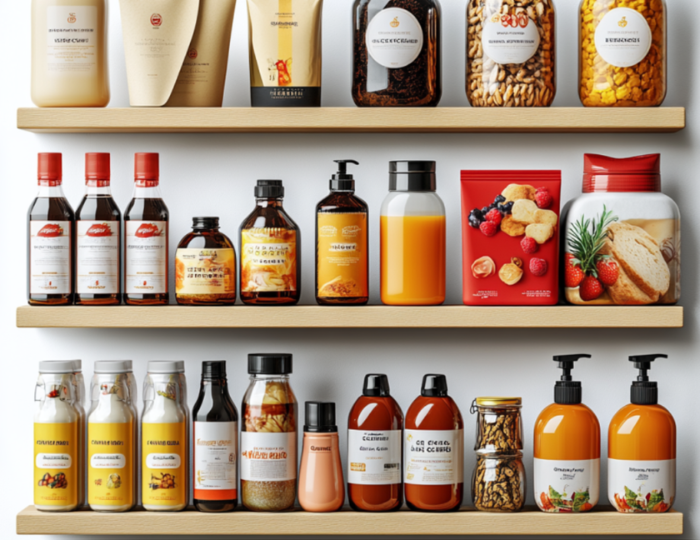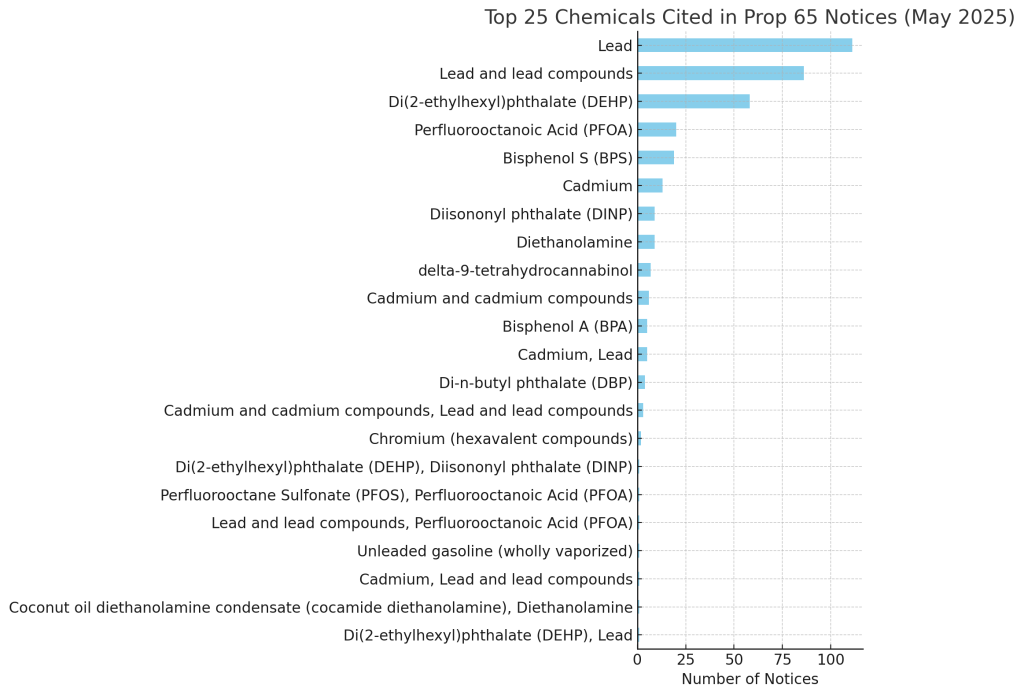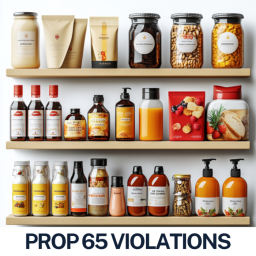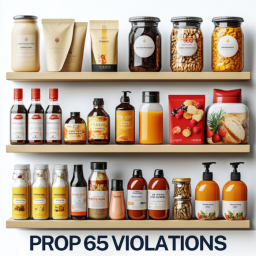
California’s Proposition 65 continues to drive aggressive enforcement activity, with substantial legal and financial exposure for companies across the consumer product space. In May 2025, 364 new Notices of Violation (NOVs) were issued—highlighting persistent scrutiny of ingredients, materials, and product categories ranging from seafood to supplements to beauty goods.
This analysis draws from public enforcement data to reveal the most cited chemicals, industry targets, and patterns in plaintiff behavior. Whether you’re manufacturing or selling in California—or simply shipping to the state—understanding this month’s Prop 65 developments is essential for managing compliance and avoiding costly disputes.
May 1–31, 2025 Proposition 65 Notice of Violation Summary
| Number of Violations | Listed Chemicals | Types of Products Targeted |
|---|---|---|
| 228 | Heavy metals (lead, cadmium, arsenic) | Sardines, salted shrimp fry, protein powders, scissors, plant weights, metal utensils, grooming tools |
| 72 | Phthalates (DEHP, DINP, DBP) | Vinyl bags, hoses, plastic storage, cases, massage beds, pouches, covers |
| 21 | PFAS (PFOA, PFNA, PFOS) | Lotions, bath bombs, CBD vapes, waterproof cases, THC oils |
| 24 | BPA, BPS | Canned beverages, food storage containers, supplements, thermal receipt paper |
| 10 | Diethanolamine, cocamide DEA | Creams, lotions, shaving gels, hair care items |
What Is Prop 65 and Why Does It Matter to Food, Beverage, Supplement, and Cosmetic Brands?
Formally called the Safe Drinking Water and Toxic Enforcement Act of 1986, Proposition 65 mandates that businesses must warn Californians about significant exposures to chemicals that cause cancer, birth defects, or other reproductive harm. The list currently includes over 900 chemicals, including lead, acrylamide, cadmium, phthalates, and PFAS.
While intended to protect public health, Prop 65 has created an active plaintiffs’ bar. Consumer advocacy groups and law firms issue hundreds of 60-day notices each month, often focusing on trace contaminants naturally present in foods or resulting from packaging.
Violations carry serious consequences:
- Civil penalties of up to $2,500 per day per violation
- Costly legal fees and settlements
- Mandatory warning labels, product reformulation, or market withdrawal
What Are the Most Common Chemicals Cited in Prop 65 Enforcement in May 2025?
| Chemical | Notices of Violation |
|---|---|
| Lead and lead compounds | 197 |
| Di(2-ethylhexyl)phthalate (DEHP) | 58 |
| Perfluorooctanoic Acid (PFOA) | 20 |
| Bisphenol S (BPS) | 19 |
| Cadmium | 13 |
| Diisononyl phthalate (DINP) | 9 |
| Diethanolamine | 9 |
Notable Chemical Trends in MAY 2025
Heavy Metals in Seafood and Tools:
Lead and cadmium were once again the top targets, frequently found in seafood products (like sardines and salted shrimp) and metal consumer goods like grooming tools, plant anchors, and tongs.
Phthalates in Vinyl Goods:
DEHP and DINP appeared repeatedly in vinyl hoses, massage beds, pouches, and storage containers, suggesting ongoing attention to soft plastics and flexible materials.
PFAS in CBD and Wellness Products:
PFOA and related PFAS chemicals were flagged in a surprising range of cannabis topicals, bath bombs, and THC concentrates, a growing enforcement area lacking safe harbor levels.
BPS and BPA Resurfacing:
Notices citing BPS (a BPA substitute) and BPA itself are rising again, especially in supplements, canned foods, and retail thermal receipts—highlighting risks in both content and packaging.
Diethanolamine in Personal Care:
Creams, gels, and men’s grooming items are still seeing scrutiny for diethanolamine, a known carcinogen under Proposition 65.
Product Categories Most Frequently Targeted in May 2025
Food and Beverage Products
- Canned Seafood (sardines, anchovies)
- Supplements (powders, capsules)
- Beverages (coconut-based, protein drinks)
- Snack foods in plastic pouches or metallic seals
Cosmetics and Grooming
- Lotions and creams
- Shaving gels, hair styling aids
- CBD topicals and vapes
Household and Consumer Goods
- Vinyl and plastic packaging
- Metal tools and accessories
- Bath bombs and beauty kits
- Thermal paper receipts

Who’s Being Targeted? The Top 10 Most Cited Companies in May 2025
| Company Name | Notices Received |
|---|---|
| Ross Stores, Inc. | 7 |
| Amazon.com, Inc. | 6 |
| The TJX Companies, Inc. | 5 |
| Hobby Lobby Stores | 2 |
| Urban Outfitters, Inc. | 2 |
| Burlington Coat Factory | 2 |
| CVS Pharmacy | 1 |
| Stater Bros. Markets | 1 |
| Wild Planet Foods | 1 |
| Call Grocery / Asia Supermarket | 1 |

What Risks Do Licensors Face When Licensees Trigger Prop 65 Violations?
When brand owners license their trademarks or intellectual property, they may still face Prop 65 exposure if their name appears on the product packaging—even if they didn’t manufacture or distribute the product. Licensors like Ross Stores, Hobby Lobby, Amazon, TJX Companies, and Five Below were once again named in May NOVs.
Best practices for licensors include:
- Requiring Prop 65 compliance warranties in all license agreements
- Mandating third-party testing by licensees
- Including indemnity and insurance obligations
- Monitoring licensee product listings and California sales
How Can My Company Avoid a Prop 65 Lawsuit?
1. Perform Ingredient and Packaging Testing
Use third-party labs to screen your finished goods and raw materials for heavy metals (lead, cadmium, arsenic), acrylamide, and phthalates. Repeat tests after sourcing or formulation changes.
2. Evaluate and Update Warning Labels
Make sure your labels:
- Follow safe harbor language requirements
- Are specific to the chemical risk involved
- Appear clearly and prominently on packaging and online
3. Strengthen Your Supplier Agreements
Add chemical compliance warranties and indemnification clauses to every vendor agreement.
4. Monitor New Notices and Industry Trends
Watch competitor categories. If others are being targeted, you’re likely at risk too.
5. Engage Experienced Legal Counsel
If you receive a 60-day notice, contact your attorney immediately. At Juris Law Group, we:
- Analyze claims
- Coordinate testing
- Negotiate settlements
- Defend enforcement actions in court
Juris Law Group: Trusted Counsel for Prop 65 Compliance and Defense
Juris Law Group is a leading law firm for food, beverage, supplement, and cosmetic brands navigating Proposition 65. As general counsel to national and global CPG companies, we offer:
- Proactive compliance programs and audits
- Custom warning label strategies
- Indemnity-focused supply chain reviews
- Fast, effective defense of 60-day notices
Why Clients Choose Us:
- Ranked in Chambers USA
- Track record defending national retailers
- Deep knowledge of enforcement tactics
Frequently Asked Questions (FAQ)
Do I have to comply if I only sell online?
Yes. Prop 65 applies to all products entering the California market, regardless of sales channel.
Are natural ingredients safe from enforcement?
No. Even “clean” products with naturally occurring metals (like cacao, turmeric, or spinach) can trigger violations.
Can I fix the issue after I get a notice?
You can label or reformulate going forward—but it won’t erase past liability. Legal action can still proceed.
What happens if I ignore a 60-day notice?
You risk getting sued, facing civil penalties, and being ordered to pull or relabel products.
Proposition 65 Q&A for Businesses and Manufacturers
Question 1: Can I be cited for Prop 65 even if my product contains only trace amounts of a listed chemical?
Yes. Even trace amounts can trigger a violation if exposure exceeds Prop 65 limits or if no warning is provided. This is common for chemicals like lead, cadmium, and phthalates.
Question 2: How does Prop 65 apply to imported products or private label items?
You may still be liable even if you didn’t manufacture the product. Distributors, importers, and retailers—including those offering white-label or private-label products—can be named in enforcement actions. If your name appears on the packaging or you’re responsible for bringing the item into California, Prop 65 obligations likely apply.
Question 3: What are plaintiffs targeting most in 2025?
Based on May 2025 data, plaintiffs are heavily focused on:
- Heavy metals in seafood and supplements
- Phthalates in vinyl packaging and personal care goods
- PFAS in cosmetics and THC products
- BPS in retail receipts
Enforcement is especially aggressive where no safe harbor levels exist (e.g., PFOA, BPS), making even low-exposure products vulnerable.
Question 4: What should I do if I sell through online platforms like Amazon or Etsy?
You are still subject to Prop 65 rules. Online sellers must ensure that Prop 65 warnings appear before checkout for California customers. Platforms like Amazon may shift liability to sellers, so it’s essential to confirm whether your listings display compliant warnings and contain up-to-date safety disclosures.
Question 5: Are cannabis and CBD brands at risk under Prop 65?
Yes. Cannabis and hemp-derived products have been increasingly targeted. Delta-9-THC and marijuana smoke are both on the Prop 65 list. Topicals, vapes, oils, and edibles can all be cited—even if used externally. In May 2025, multiple notices targeted CBD and THC-infused goods for chemical content and lack of warnings.
Want to Protect Your Brand from a Prop 65 Lawsuit?
To speak with a regulatory attorney or schedule a compliance audit, contact us today:
📧 [email protected]








